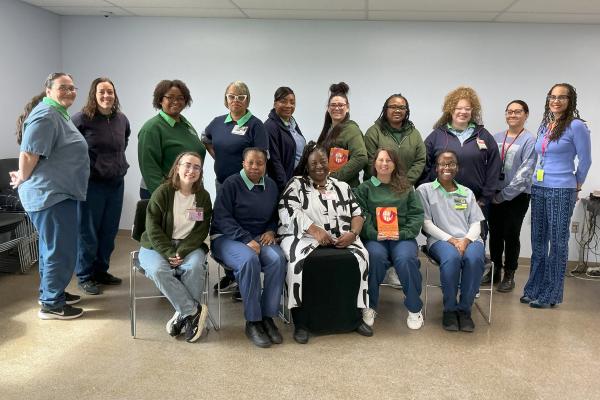LAM Collective Hosts Loretta Ross

On March 24th, OPEEP and the FREE Center had the honor of hosting prominent scholar and activist Loretta Ross, one of the founding members of SisterSong and Women of Color Reproductive Justice Collective, and is one of twelve women credited with coining the phrase and framework “reproductive justice.” She continues to be regarded as an expert on women’s rights and continually combats racism, sexism and sexual violence, particularly by creating coalitions by and for women affected by these inequities.
Ross visited the Ohio Reformatory for Women (ORW) and met with Liberations at the Margins (LAM) Collective to talk about her new book, Calling In: How to Start Making Change with Those You'd Rather Cancel. Each member of LAM received a copy of the book and had the chance to read it before the visit, which provided them an opportunity to engage in meaningful conversations. The group connected over shared experiences with Ross, whom LAM member Heather wrote about, saying “She answered our questions with raw honesty and a clear message that mistakes are part of the human journey. She offered the wisdom that we will continue to make mistakes throughout our lives. Ms. Ross continually reminded us that we can choose to listen to those with whom we disagree as a practice of calling them in to a new joint understanding.”
Later that same day, Ross gave a public talk, titled, Reproductive Justice as Human Rights, at WOSU, an event which drew over 200 people, including students, faculty, staff, and community members. Several community organizations active in the Reproductive Justice space were featured during the pre-reception. These organizations included: Planned Parenthood Advocates of Ohio, Abortion Fund of Ohio, Ohio Policy Evaluation Network (OPEN), Abortion Forward, and Ohio Women’s Alliance. Representatives from each organization provided informational materials, answered questions, and detailed their advocacy efforts.
During the talk, Loretta Ross spoke about her activist background, the founding of Sister Song, and the origins of the famous tenets of Reproductive Justice. She describes her work in the movement as intersectional and collaborative. For example, Ross credits the fourth tenet, “the right to nurture the children we have in a safe and healthy environment”, with her effort to bring pro-life activists to the Reproductive Justice framework.
In her new book, Ross emphasizes that allies can come from a variety of places and that they do not need to be ideologically aligned to work towards common goals. Her sentiments, especially the emphasis on solidarity, unity, and collaboration, provided the audience with useful tools to navigate the politically divisive climate.
